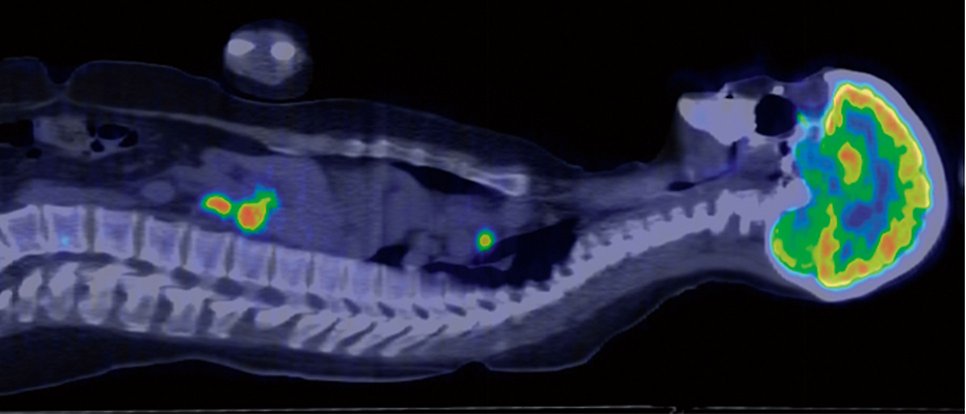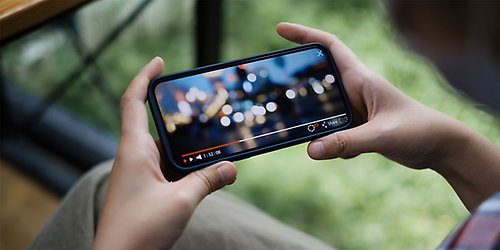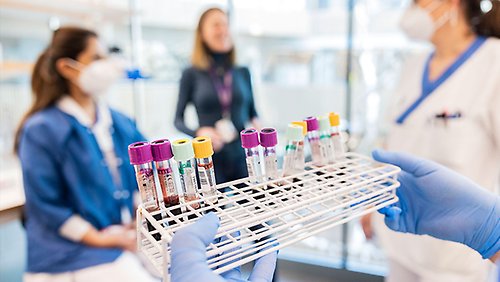Master's Programme in Medical Nuclide Techniques
120 credits

Are you interested in research and development in molecular imaging and tumour therapy? As a student in the Master's programme in Medical Nuclide Techniques, you will obtain in-depth knowledge about the use of radionuclides in research and healthcare. You will follow the process of developing radiolabeled drugs for advanced imaging and therapy and this in-depth knowledge in a multidisciplinary area prepares you for a career in research or drug development.
Autumn 2023 Autumn 2023, Uppsala, 100%, On-campus, English
- Location
- Uppsala
- Pace of study
- 100%
- Teaching form
- On-campus
- Instructional time
- Daytime
- Start date
- 28 August 2023
- Language of instruction
- English
- Entry requirements
-
Academic requirements
A Bachelor's degree, equivalent to a Swedish Kandidatexamen, from an internationally recognised university. The main field of study must be medicine, pharmacy, physics, radiophysics, chemistry, biology, or a similar field of study.
Language requirements
Proficiency in English equivalent to the Swedish upper secondary course English 6. This requirement can be met either by achieving the required score on an internationally recognised test, or by previous upper secondary or university studies in some countries. Detailed instructions on how to provide evidence of your English proficiency are available at universityadmissions.se.
- Selection
-
Students are selected based on an overall appraisal of previous university studies and a statement of purpose.
Tuition fee-paying students and non-paying students are admitted on the same grounds but in different selection groups.
- Fees
-
If you are not a citizen of a European Union (EU) or European Economic Area (EEA) country, or Switzerland, you are required to pay application and tuition fees.
- Application fee: SEK 900
- First tuition fee instalment: SEK 72,500
- Total tuition fee: SEK 290,000
- Application deadline
- 16 January 2023
- Application code
- UU-M3860
- Additional information
-
In addition to the general supporting documents, you also need to submit a programme-specific application summary sheet Pdf, 174 kB..
Check the application guide for information on how to apply and what other supporting documents you need to submit.
There are two admissions rounds for this Master's programme. We strongly encourage all international students to apply in the first admissions round. The second admissions round is primarily for Swedish students and citizens of an EU/EEA country or Switzerland. Key dates for application to the autumn semester.
Autumn 2024 Autumn 2024, Uppsala, 100%, On-campus, English
- Location
- Uppsala
- Pace of study
- 100%
- Teaching form
- On-campus
- Instructional time
- Daytime
- Start date
- 2 September 2024
- Language of instruction
- English
- Entry requirements
-
Academic requirements
A Bachelor's degree, equivalent to a Swedish Kandidatexamen, from an internationally recognised university. The main field of study must be medicine, pharmacy, physics, radiophysics, chemistry, biology, or a similar field of study.
Language requirements
Proficiency in English equivalent to the Swedish upper secondary course English 6. This requirement can be met either by achieving the required score on an internationally recognised test, or by previous upper secondary or university studies in some countries. Detailed instructions on how to provide evidence of your English proficiency are available at universityadmissions.se.
- Selection
-
Students are selected based on an overall appraisal of previous university studies and a statement of purpose.
- Fees
-
If you are not a citizen of a European Union (EU) or European Economic Area (EEA) country, or Switzerland, you are required to pay application and tuition fees.
- Application fee: SEK 900
- First tuition fee instalment: SEK 72,500
- Total tuition fee: SEK 290,000
- Application deadline
- 15 April 2024
- Application code
- UU-P3860
- Additional information
-
In addition to the general supporting documents, you also need to submit a programme-specific application summary sheet Pdf, 174 kB..
Check the application guide for information on how to apply and what other supporting documents you need to submit.
There are two admissions rounds for this Master's programme. We strongly encourage all international students to apply in the first admissions round. The second admissions round is primarily for Swedish students and citizens of an EU/EEA country or Switzerland. Key dates for application to the autumn semester.
About the programme
The development of radioactive compounds for preclinical research, medical imaging or tumour therapy requires competence in several areas.
In the Master's programme in Medical Nuclide Techniques, you will
- learn methods and technologies for producing, assessing and measuring ionising radiation,
- study physical and biological aspects of ionising radiation, including sources of radiation, measurements and estimates of radiation effects and risks,
- study strategies for compound development, labelling techniques, testing and evaluation of radionuclide-labelled compounds aimed for in vitro and in vivo (PET, SPECT) research and clinical practice,
- do an independent project in a research group at an academic department, in a company or another agency in Sweden or abroad.
Further studies also involve the function and application of detectors and imaging modalities in research and clinical practice. This includes PET (positron emission tomography) cameras and how to assure product quality and patient safety in the production of pharmaceutical compounds.
Student profile
You are very interested in the use and development of methods where radioactive nuclides are used in research, diagnostics and therapies. You want to gain skills and interdisciplinary knowledge preparing you for international PhD studies or jobs within academia, healthcare or the Life Science industry.
You have completed bachelor's studies in natural science, pharmacy or medicine, and have some practical experiences from lab work. You have excellent English skills and want to work in an international setting with colleagues from all over the world. You are curious, enjoy problem-solving, and are highly motivated to pursue a career in academic research or industry.
Degree
The programme leads to the degree of Master of Medical Science (120 credits) with Medical Nuclide Techniques as the main field of study. After one year of study, it is possible to obtain a degree of Master of Medical Science (60 credits).
Content
The first semester focuses on the unique properties of ionising radiation and radionuclides and includes theoretical and practical training about radiation types and sources, medical use, development of pharmaceutical compounds and techniques to optimise detection and measurement. An important part of the education involves good manufacturing practice (GMP), i.e. how to assure product quality and patient safety in the production of pharmaceutical compounds. The first semester also features a seminar series covering a variety of topics such as project leadership, design methods, biostatistics, presentation techniques and research ethics.
During the second semester, you will apply your knowledge from the previous semester with an emphasis on potential strategies for research and clinical applications of radionuclides for medical imaging and cancer therapy. The semester ends with an individual project where you can study, as a literature project or experimental work, an area of specific interest.
The overall aim of the third semester is to give advanced knowledge on methods used for radiolabelling of biologically interesting molecules of low and high molecular weight aimed for use in molecular imaging studies (mainly PET and SPECT), preclinical evaluation of radioligands, and an overview of their clinical use. You will be trained in experimental design as well as independently analyse and interpret research results and data generated by current methods and technologies.
During the fourth semester, the Master's Programme in Medical Nuclide Techniques is concluded with an independent Master's degree project within the field, which may be performed within the academy, at a biotech/pharma company or in the public sector. You conclude the degree project by writing a thesis, compiling the research results, and giving a research seminar.
Courses within the programme
Year 1
- Radiation Protection and Medical Effects, 6 credits
- Nuclide Production and Radiochemistry, 9 credits
- Detection Techniques and Dosimetry, 12 credits
- Good Manufacturing Practice, 6 credits
- Nuclide Diagnostics and Therapy, 12 credits
- Project Work, 15 credits
Year 2
- Labelling Chemistry and Compound Development, 30 credits
- Project Work, 30 credits
Learning experience
Teaching is made up of scheduled lectures, laboratory exercises, seminars, problem-oriented group assignments, demonstrations and study visits. All lectures are closely connected to current international research and include presentations of ongoing research at the departments as well as instruction by invited scientists.
The seminars are designed to develop your ability to understand, interpret and critically evaluate scientific literature. This also includes exercises in discussing results, choices of methods and summarising facts and hypotheses both orally and in writing.
The increasing depth of theoretical knowledge is measured in the examination of course components. Your ability to analyse, evaluate and draw conclusions from scientific data is judged in specific seminars and theoretical tasks. Practical experience in experimental strategies and scientific problem solving are integrated as compulsory parts of your studies. Your creativity and problem-solving abilities will develop through in-depth assignments and the Master's degree project.
The programme will also give you insights into presentation techniques and research ethics. The programme is given in Uppsala and the language of instruction is English.
Career
There is an increasing demand for knowledge in nuclide techniques for physicians, pharmacists, physicists, biologists and chemists. With an advanced education in medical nuclide techniques, you are expected to go on to a career in research, healthcare systems, pharma or biotechnology companies, and governmental organisations.
Our graduates work at, for example, universities, hospitals, and pharmaceutical companies. Job titles include radiochemist, lab engineer, production manager, PhD student, researcher and university lecturer.
The strong association with research in the Master's Programme in Medical Nuclide Techniques gives you an excellent basis for further academic research and PhD studies in the field.
Career support
During your time as a student, UU Careers offers support and guidance. You have the opportunity to take part in a variety of activities and events that will prepare you for your future career.
Programme video
Watch our video about the programme.

Studies in medicine and pharmacy
Watch our video about the Disciplinary Domain of Medicine and Pharmacy.

Register your interest
Keep updated about the application process.

Contact
- For programme-specific information, please contact the programme director Bo Stenerlöw:
- bo.stenerlow@igp.uu.se
- +46 70 425 05 49
- For general information or questions about the Master´s Programmes at the Faculty of Medicine, please contact:
- medmaster@uu.se
- Book an appointment with a study counsellor at the Faculty.
- For admissions-related or general information, please contact our applicant support team:
- masterprogrammes@uu.se
Students
As a student you will find information about your studies in the student gateway.
